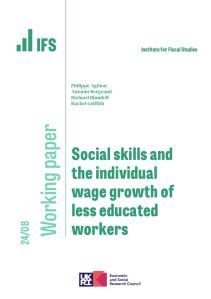In this paper, I revisit the central trade-off between insurance and incentives in the design of unemployment insurance policies. The generosity of unemployment insurance benefits differs not only across countries, but also across workers within countries. After illustrating some important dimensions of heterogeneity in a cross-country analysis, I extend the standard Baily–Chetty formula to identify the key empirical moments and elasticities required to evaluate the differentiated unemployment policy within a country. I also review some prior work and aim to provide guidance for future work trying to inform the design of unemployment policies.
Authors

Research Fellow London School of Economics
Johannes is a Research Fellow at the IFS, a Co-Editor at the Journal of Public Economics and an Associate Professor in Economics at the LSE.
Journal article details
- DOI
- 10.1111/1475-5890.12199
- Publisher
- Wiley
- Issue
- Volume 41, Issue 1, May 2020, pages 101-127
Suggested citation
Spinnewijn, J. (2020). 'The Trade-Off between Insurance and Incentives in Differentiated Unemployment Policies' , 41(1/2020), pp.101–127.
More from IFS
Understand this issue

Big firm, little firm: are differences between companies driving inequality and holding back growth?
30 August 2023

Don’t cheer end of earnings squeeze: there is more pain to come
19 June 2023

The economics of immigration
8 June 2023
Policy analysis

How has the NLW affected pay differentials within firms?
16 February 2024

Progression of nurses within the NHS
12 April 2024

Implications of the NHS workforce plan
30 August 2023
Academic research

Labour market inequality and the changing life cycle profile of male and female wages
15 April 2024

Social skills and the individual wage growth of less educated workers
27 March 2024

The menopause "penalty"
18 March 2024